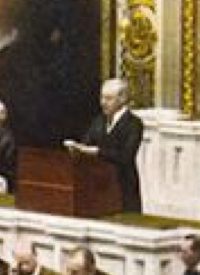
George Washington warned Americans “… to steer clear of permanent alliances with any portion of the foreign world…” “Peace, commerce and honest friendship with all nations; entangling alliances with none,” our third President, Thomas Jefferson, would phrase the same sentiment. Europe, in particular, had long been immersed in the cynical balance of power politics which brought nations to join together to block the hegemony of other nations.
This tendency toward forming alliances is often considered to be guided by religion, although that was often not the case. So, to restrain the power of the Hapsburg realms, which included not only Spain but also Austria, the Lowlands, southern Italy, a sprinkling of small possessions scattered throughout Germany, and vast lands in the New World, the French monarchy sided with the Muslim Ottoman Empire against Spain.
The Thirty Years War, which ended with the Treaty of Westphalia in 1648, was not ancient history to our Founding Fathers. That war caused the death of one third of the population of Germany (which was not yet united), as Swedish, Hapsburg, and French armies conquered and reconquered cities, baronies, and duchies, leaving the resident populations destitute and traumatized.
The Founding Fathers and the Constitution they created were not victims of sophomoric idealism. Men such as Washington knew that sometimes free men must fight for their freedom. But the Constitution did create safeguards against the sort of cavalier attitude toward war and the Clausewitzian notion that “war is a continuation of politics by other means.”
So, Article I, Section 8 provides that Congress may pass bills “…to raise and support Armies, but no Appropriation of Money to that Use shall be for a longer Term than two Years.” The same article grants Congress the exclusive power “…to declare War, grant Letters of Marque and Reprisal, and make Rules concerning Captures on Land and Water.”
The powers of Congress over the military are much greater than we are used to today, as Section 8 also grants power to Congress “…to make Rules for the Government and Regulation of the land and naval Forces.” Congress, and not the President, was given the power “… to provide for calling forth the Militia to execute the Laws of the Union, suppress Insurrections and repel Invasions.”
War was something that Americans instinctively disliked, not only as murderous and destructive but also as naturally corrosive of liberty. So before our nation entered into war, Congress was given the exclusive power to make that decision. Constitutional mythology has led many Americans to believe that Congress may declare war only if the President asks. Actually, Congress may declare war even if the President opposes that declaration, although no Congress has ever entered our nation into a war over the opposition of the President, who is the Commander-in-Chief of our military.
Instead, Presidents have asked Congress to declare war in pursuit of perceived threats to our nation or, in the case of the Civil War, President Lincoln took the power to “suppress Insurrections” essentially into the executive branch. Lincoln not only took full control over this action, but he had arrested federal officers who disagreed with him, most notably Congressman Clement Vallandigham.
On April 2nd, 1917, Woodrow Wilson, having campaigned and barely won reelection on the slogan “He kept us out of war,” asked Congress to enter our nation in what was long called simply “The Great War,” and which we call the First World War. Two days after his address, Congress declared war as Wilson had asked.
This terrible war included fronts that encompassed most of Europe. The “Western Front,” stretched across northern France and a sliver of Belgium, where French, British, British Dominion democracies, and Belgian forces faced German troops with a smattering of Austro-Hungarian troops. On other fronts in Russia, Italy, and the Middle East, collections of troops from many nations fought long, murderous campaigns.
This war began because of the execution of systems of alliances and guarantees between the “Triple Alliance” of Germany, Austria-Hungary, and Italy and the “Triple Entente” of France, Russia, and Britain. (Italy, though, actually fought against the Austrians and Germans.) It is hard to imagine a more pointed example of the “entangling alliances” and the abandonment of the unbiased trade with nations than the First World War.
Britain, early in the First World War, imposed a blockade on American trade with Imperial Germany, and the Royal Navy extended that to limit the imports of completely neutral nations. So the Netherlands, Denmark, Norway, and Sweden could not trade freely with our nation because freighters headed from New York to Amsterdam (for example) would be stopped and searched for any cargo that might be sold to Germany.
Wilson, having called Congress into special session, asked for a declaration of war against Germany largely based upon the German U-boat campaign to deprive Britain of trade just as the British surface fleet had deprived Germany of trade. The supercilious pseudo-idealism of Wilson is reflected in this sort of language in his address to ask for war:
Because submarines are in effect outlaws when used as the German submarines have been used against merchant shipping, it is impossible to defend ships against their attacks as the law of nations has assumed that merchantmen would defend themselves against privateers or cruisers, visible craft giving chase upon the open sea. It is common prudence in such circumstances, grim necessity indeed, to endeavour to destroy them before they have shown their own intention.
The idea that depriving British children of food by U-boat attack was somehow more odious than depriving German child of food by blockade, which extended even after the Armistice was signed, is one of the most specious reasons for a declaration of war. (What make this even more absurd, in the context of history, is the American use of submarines to starve Japan in the Second World War or the firebombing of cities such as Hamburg by American and RAF forces in that same war.)
Congress did declare war, as Wilson asked, and American forces sailed across the ocean, far away from our borders and our natural security interests, to tip the balance on the side of nations which, he claimed, were on the side of freedom, as he said in the same address:
Our object now, as then, is to vindicate the principles of peace and justice in the life of the world as against selfish and autocratic power and to set up amongst the really free and self-government peoples of the world such a concert of purpose and of action as will henceforth insure the observance of those principles.
The vast ignorance and hubris of Wilson is displayed in those words. Germany had a constitutional monarchy with strong states’ rights, loud opposition parties, and a substantial decree of freedom — very similar, in fact, to several of Germany’s enemies in the war such as the kingdom of Italy, the kingdom of Britain and the empire of Japan.
Did it make a difference to America in 1917 which side, the Central Powers or the Allied Powers, won the war? Not really. Germany was prostrate like France, Russia, and Britain. The romance of war had died in Europe. What it cost America, however, was dreadful. Our doughboys were sent across an ocean to fight an enemy that did not threaten us and could not harm us. We entered the whole, awful system of global alliances and “nation building” that plagues us to this day, 75 years later.
Photo: President Woodrow Wilson asking Congress to declare war on Germany, April 2, 1917.



